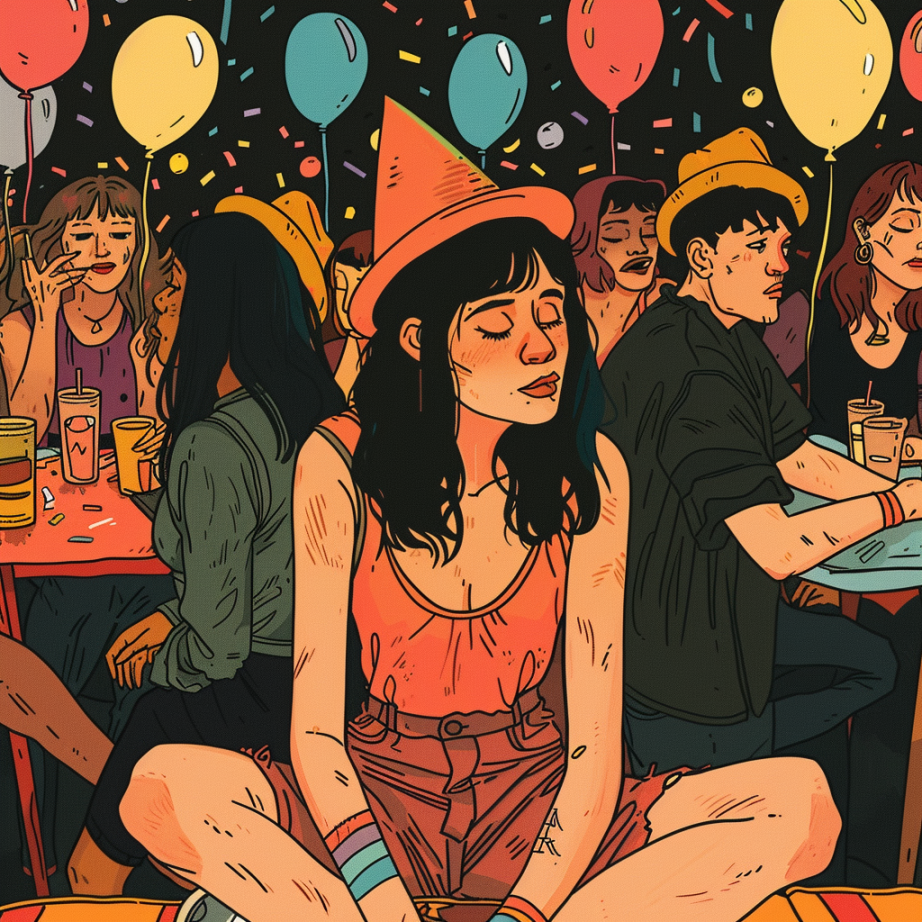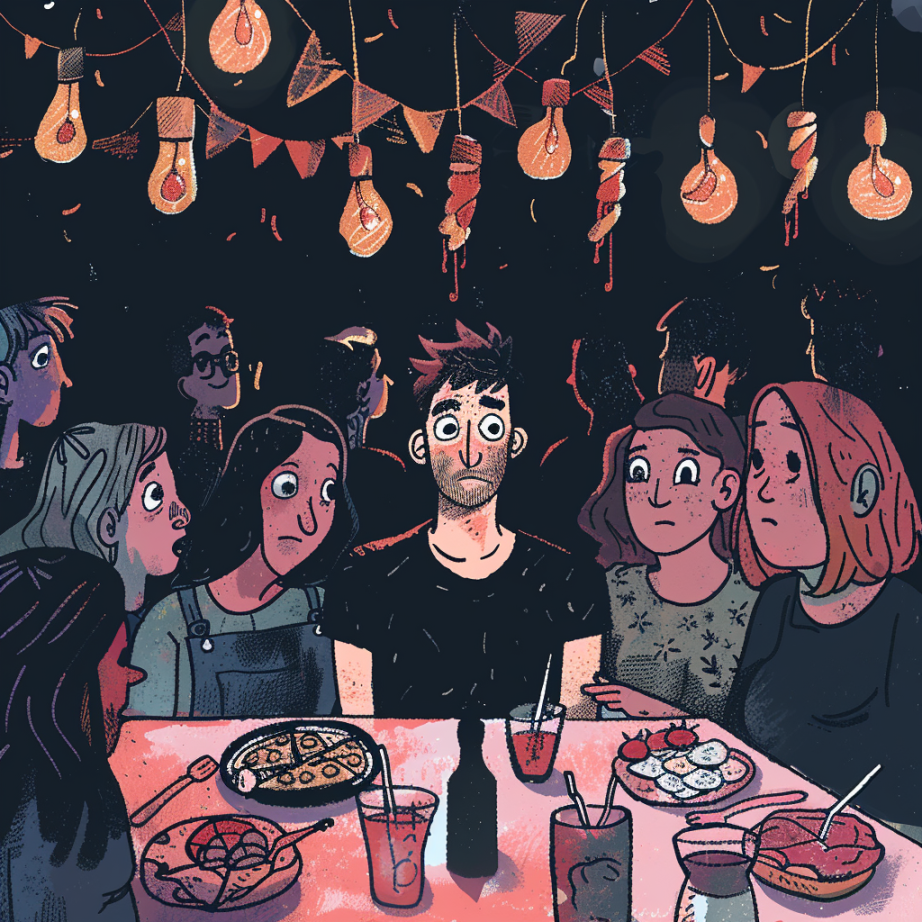Recently, my boss threw an office party where all the employees had a great time. As a co-host, I was invited but chose not to go. When a woman asked me, “So, you’re not into hanging out with people?”
I simply said, “No, not really.”
That’s the honest truth. And I know for a fact that there are other people like me as well who feel differently about socializing. But, they are always searching answer for “I don’t like parties, is this normal?”
So, because I really care for all people like me, here are the top 10 reasons why social events just aren’t my thing. But before that, let’s address the elephant in the room.
I don’t like parties, is this normal?

Absolutely, it is completely normal to not like parties. Whether it’s due to your personality, preferences, or even temporary situational reasons, it’s a valid and common experience.
It’s important to remember that you don’t owe anyone an explanation for not enjoying parties. You can politely decline invitations and prioritize activities that bring you joy and peace. Additionally, there are many ways to socialize outside of traditional parties, such as:
- Meeting up with one or two friends for coffee or a meal.
- Joining a club or group focused on your interests.
- Volunteering in your community.
Ultimately, the key is to surround yourself with people and activities that make you feel comfortable and happy, regardless of what others do or expect.
10 Reasons for Why Don’t I Like Parties

- Socializing Feels Like a Performance: For some, the act of socializing at parties doesn’t come naturally or enjoyably. It can feel like a performance where one has to constantly monitor what they say and how they act, especially in a setting where conversations are not just between two people but potentially a larger group that’s within earshot. This can be draining and unenjoyable for individuals who prefer more meaningful conversations over small talk.
- Feeling of Isolation in a Crowd: It’s possible to feel alone even when surrounded by people. This feeling can be exacerbated in environments where it seems like everyone else shares common interests or backgrounds that one does not. Parties can sometimes highlight these differences, making one feel more isolated rather than connected.
- Pressure of Courtship and Social Expectations: Parties often come with the expectation of engaging in flirtatious behavior or finding romantic connections. For those who are not interested in this aspect, are not a party person, or find it stressful, parties can be a source of anxiety. The pressure to conform to certain social norms or behaviors can be off-putting.
- Not Fitting in with the Crowd: Feeling like an outsider or not sharing the same interests as the majority of party-goers can make social events less appealing. This can be particularly true for individuals with unique hobbies, beliefs, or personalities that don’t align with the mainstream or the prevalent culture at the party.
- Disinterest in Superficial Interactions: Some people find no joy in the small talk and superficial interactions that often come with parties. They might crave deeper, more meaningful conversations and find the lack of such discussions at parties to be unfulfilling and a waste of time.
- Sensitivity to Overstimulation: Parties can be overwhelming due to loud music, crowded spaces, and constant social interaction. For individuals who are sensitive to overstimulation, this environment can be uncomfortable and exhausting, leading to a preference for more quiet and intimate gatherings.
- Value of Time: Individuals who place a high value on their time might view parties as unproductive or not the best use of their time. They might prefer to engage in activities that they find more fulfilling or that contribute to their personal or professional goals.
- Past Negative Experiences: Previous negative experiences at parties, such as feeling out of place, not enjoying oneself, or encountering uncomfortable situations, can deter someone from wanting to attend future social events.
- Introversion: Introverted individuals might find parties draining and prefer to spend time alone or in smaller, more controlled social settings where they can have deeper conversations and connections.
- Lack of Interest in Common Party Activities: If the typical activities at parties, such as dancing, drinking, or playing games, do not appeal to someone, they might find little reason to attend.
Socializing Beyond Parties

I don’t like parties or drinking, but that’s completely fine.
While parties are a common social activity, they aren’t everyone’s cup of tea. Whether you’re an introvert who thrives on one-on-one interactions or simply prefer quieter settings, there are countless ways to connect with others outside the bustling party scene. Here are some alternative avenues for fulfilling your social needs:
1. Seek Out Smaller Gatherings:
- Coffee & Conversations: Opt for intimate coffee dates or group outings with a few close friends. These relaxed settings foster deeper connections and allow for meaningful conversations.
- Game Nights: Host or join game nights with friends or colleagues who share your passion for board games, video games, or card games. Laughter and friendly competition can create a fun and engaging social atmosphere.
- Book Clubs: Dive into the world of literature with a local book club. Discussing shared reading experiences and diverse perspectives can be enriching and spark new friendships.
2. Fuel Your Passions Through Shared Interests:
- Clubs & Groups: Join clubs or groups centered around your hobbies or interests, whether it’s photography, hiking, or volunteering. Connecting with like-minded individuals fosters a sense of community and allows you to learn new skills while making friends.
- Skill-Sharing Workshops: Attend workshops or classes related to your interests. Not only will you gain new knowledge and hone your skills, but you’ll also meet people who share your passion and are eager to learn alongside you.
- Volunteer Activities: Give back to your community by volunteering for a cause you care about. Volunteering provides a meaningful way to connect with others while making a positive impact on society.
3. Embrace the Digital World (Responsibly):
- Online Communities: Join online forums or groups centered around your interests. These platforms offer opportunities to connect with individuals from all over the world who share your passions.
- Virtual Events: Many organizations and individuals host virtual events like webinars, lectures, or workshops. These online gatherings allow you to engage with the content and connect with others who share similar interests, regardless of your location.
- Remember: While online interactions can be valuable, striking a balance between digital and in-person interactions is crucial for fostering authentic connections.
There’s no one-size-fits-all approach to socializing. Experiment with different activities and settings to discover what truly resonates with you. Don’t feel pressured to conform to societal expectations or attend events that leave you feeling drained or uncomfortable. Embrace your unique social style and prioritize experiences that bring you joy and connection, regardless of whether they involve a party atmosphere or not.
Ever feel like a stranger to yourself? Embark on a journey of self-discovery with our actionable guide!
You’re Not Alone
Parties can either scare you or excite you, depending on your perspective. Obviously, if you’re dealing with serious anxiety and haven’t found a good way to manage it yet, going to parties might not be the best idea. However, if you’re eager to push your boundaries and improve your social skills, parties are a great opportunity. But in the end, just remember that I don’t like partying is a completely normal feeling and that there are other ways of socializing as well.
FAQs
Is it OK to avoid parties?
Absolutely! It’s normal to prefer quieter activities or smaller gatherings. Socialization comes in various forms, so prioritize what works for you.
Why do introverts avoid parties?
Introverts gain energy from solitude and find large crowds draining. Parties’ stimulation can be overwhelming for them.
Is it rude to not go to a party?
Not necessarily. Politely decline if it doesn’t align with your preferences. Offer an alternative or excuse if desired.
Why do parties give me anxiety?
Parties can trigger social anxiety due to crowds, noise, and social pressure. Feeling overwhelmed and anxious in such situations is valid.